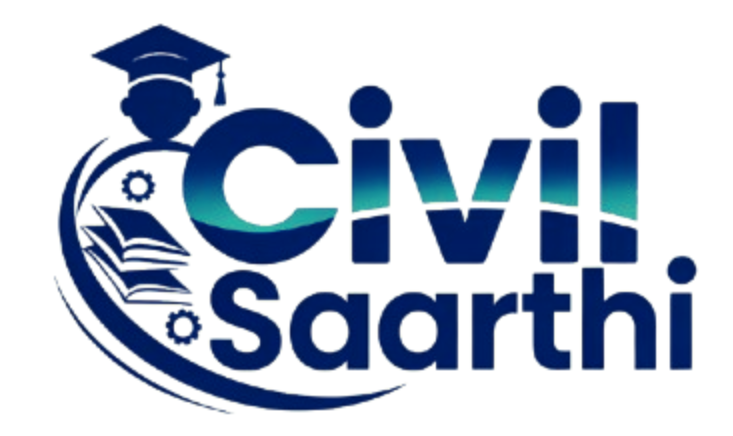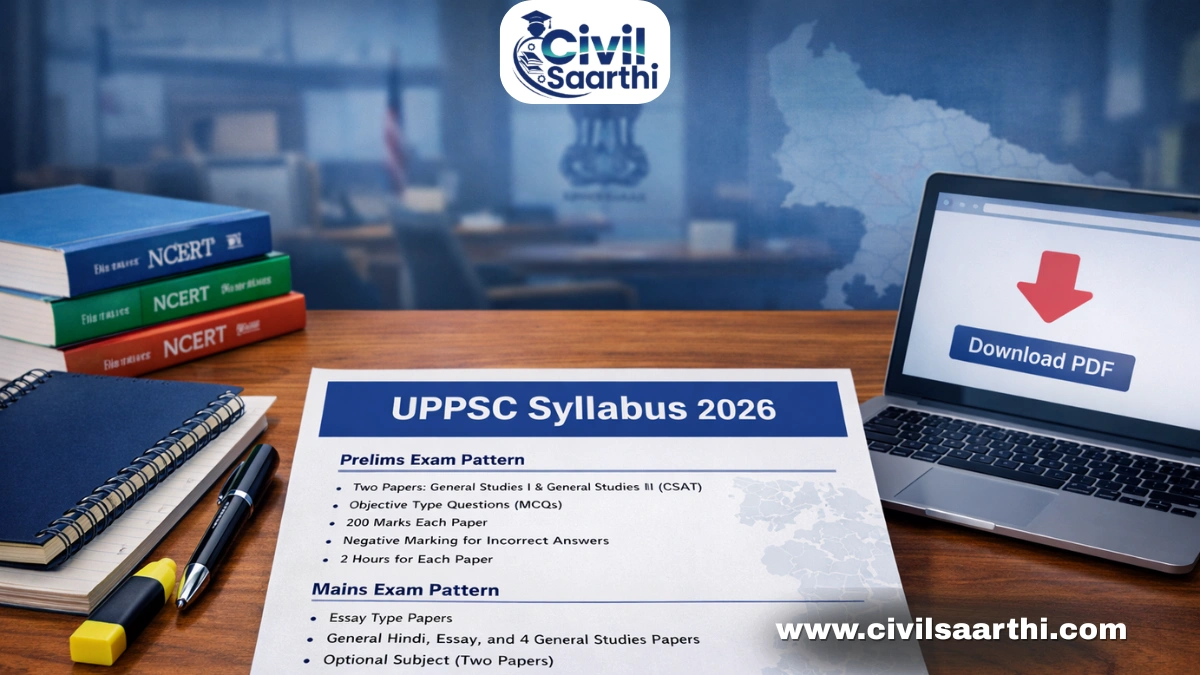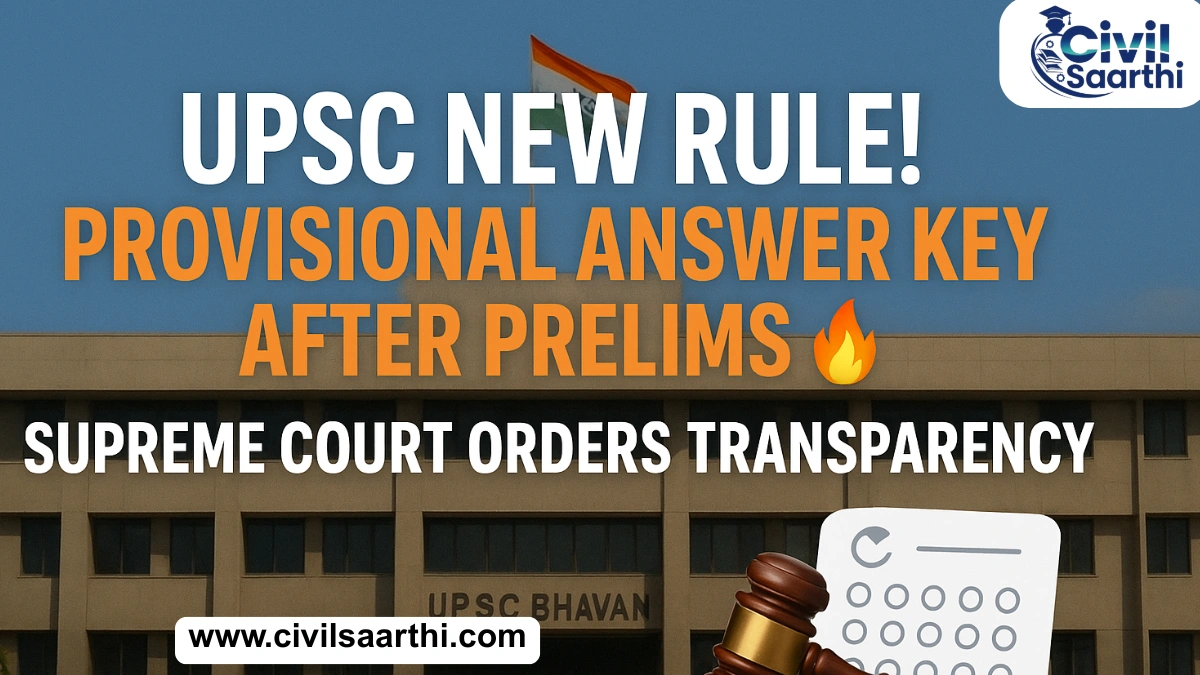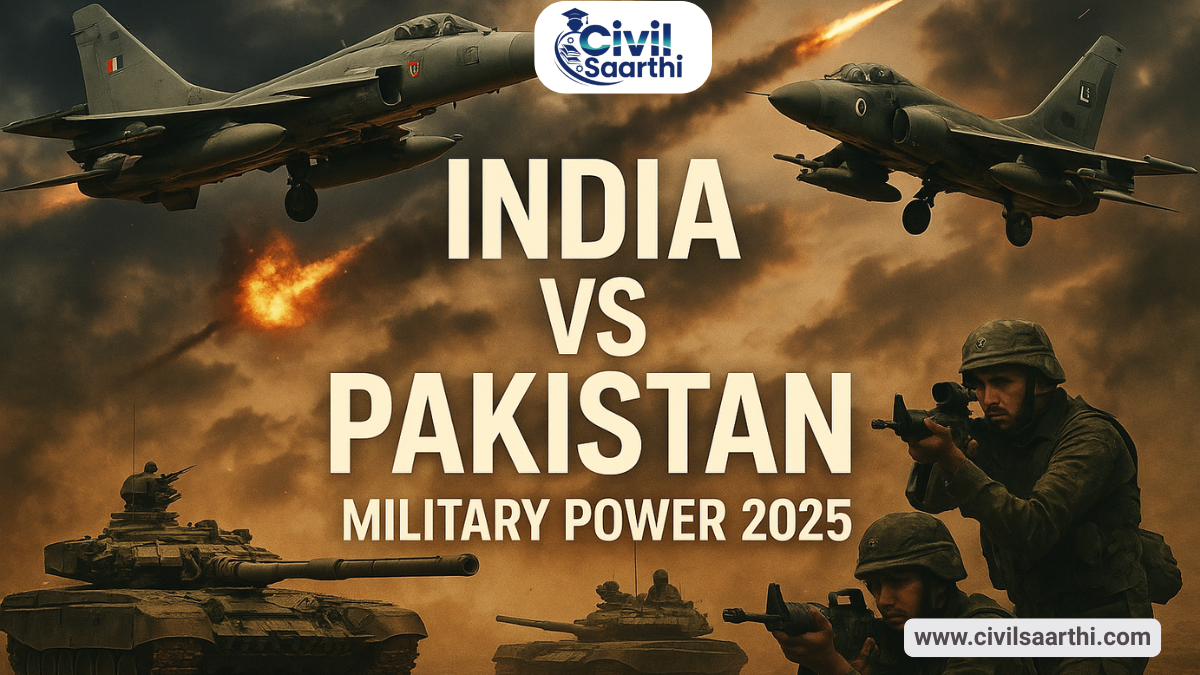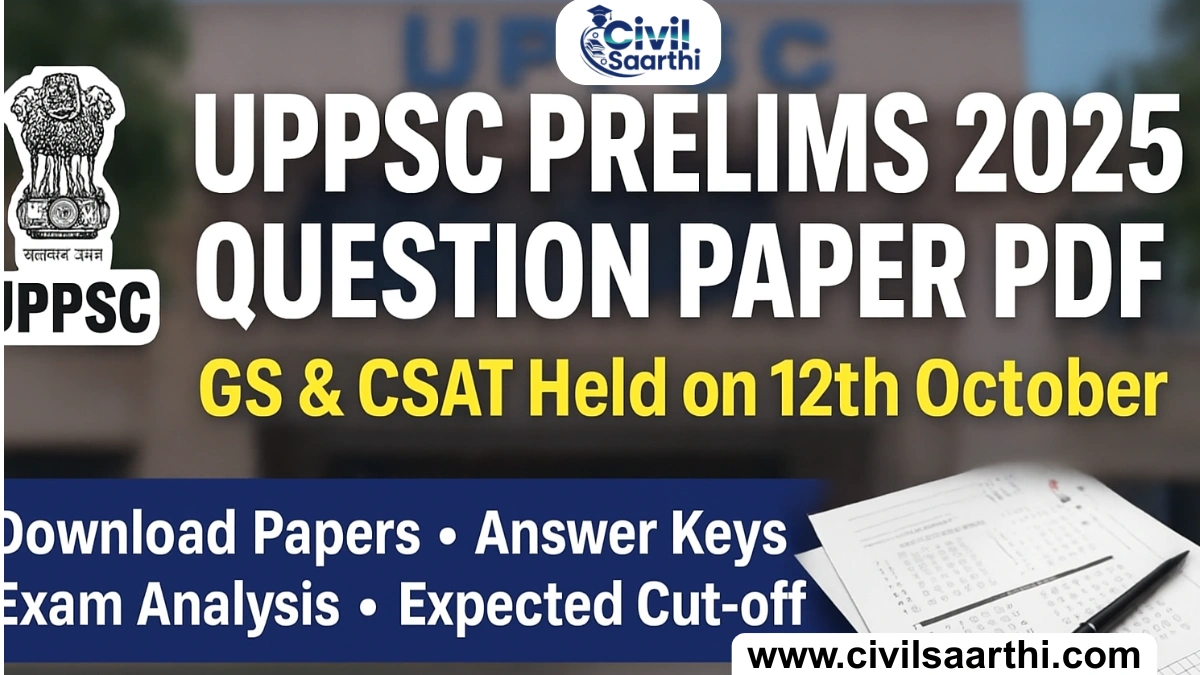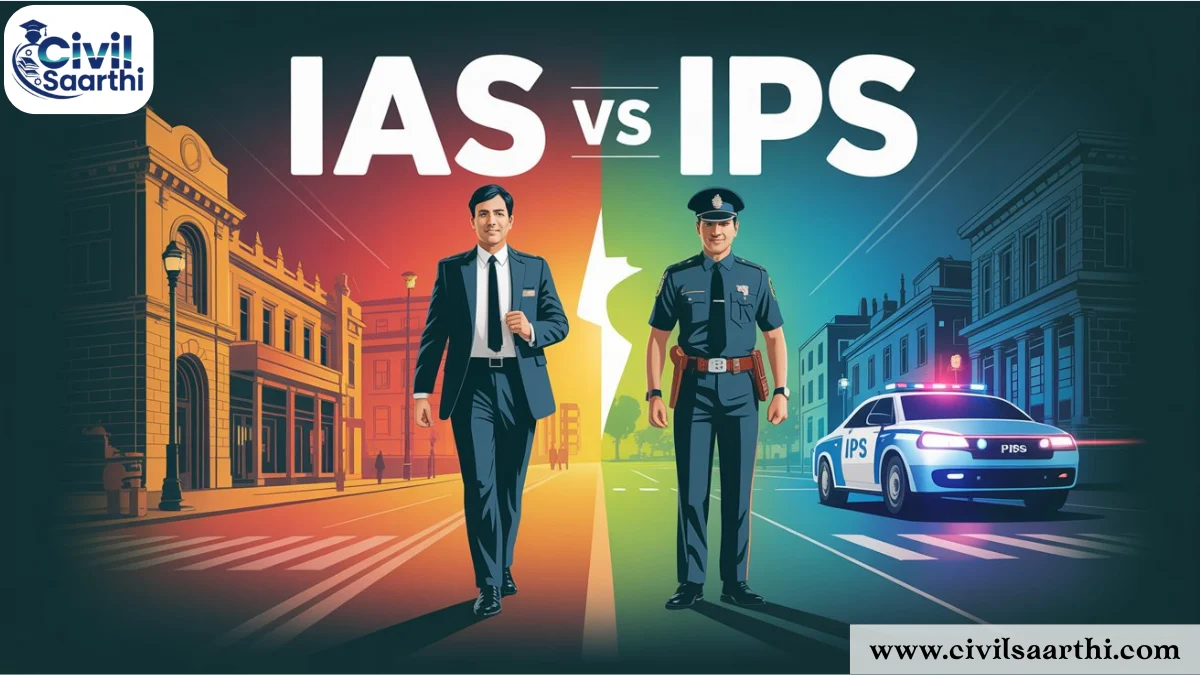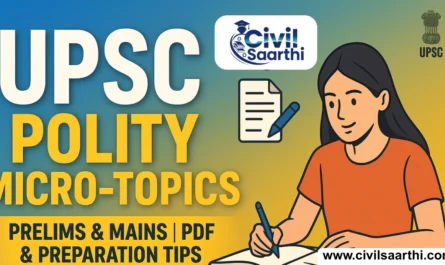The UPPSC Syllabus 2026 along with the updated exam pattern provides a complete roadmap for candidates preparing for both Prelims and Mains. Aspirants can also access the detailed syllabus PDF download to streamline their preparation and focus on high-scoring areas.
UPPSC Syllabus 2026
The UPPSC Syllabus 2026 is structured into three stages: Prelims, Mains, and Interview. The Prelims test general studies and aptitude, while the Mains focuses on descriptive papers covering subjects like Polity, Economy, History, Geography, Science, Ethics, and Uttar Pradesh-specific topics. Finally, the Interview evaluates personality, communication skills, and suitability for administrative roles. A clear understanding of the syllabus is crucial for effective preparation.
Download UPPSC Syllabus and Exam Pattern 2026 PDF
UPPSC Exam Pattern 2026 Prelims
The Preliminary Examination is the first stage of the UPPSC selection process. It consists of two objective-type papers held on the same day. Paper I is considered for cutoff, while Paper II (CSAT) is qualifying in nature.
Also Read: UPPSC Exam Calendar 2026
| Paper | Subject | No. of Questions | Marks | Duration | Nature |
|---|---|---|---|---|---|
| Paper I | General Studies-I | 150 | 200 | 2 Hours | Counted for cutoff |
| Paper II | General Studies-II (CSAT) | 100 | 200 | 2 Hours | Qualifying (33% required) |
- Each question carries equal marks, and 1/3rd negative marking applies for wrong answers.
- Both papers are objective type (MCQ) and conducted offline in pen-paper mode.
UPPSC Prelims 2026 – Subject-wise Weightage
The UPPSC Prelims 2026 subject-wise weightage shows that Current Affairs, History, Polity, Geography, Environment, and UP-specific topics carry the highest share of questions. Focusing on these areas can significantly improve scoring potential in Paper I.
| Subject / Topic | Expected No. of Questions | Importance Level |
|---|---|---|
| History of India & National Movement | 20–25 | High |
| Indian Polity & Governance | 15–20 | High |
| Indian & World Geography (with focus on UP) | 18–22 | High |
| Economy & Social Development | 10–15 | Moderate |
| Environment, Ecology & Climate Change | 15–18 | High |
| General Science & Technology | 15–20 | Moderate |
| Current Affairs (National & International) | 25–30 | Very High |
| Uttar Pradesh Special (History, Geography, Schemes, Policies) | 10–12 | High |
| Miscellaneous (Reports, Indices, Awards, Sports, etc.) | 5–8 | Moderate |
UPPSC Prelims Syllabus 2026 for Paper I General Studies-I)
This paper is the most important in the Prelims stage, as its marks are counted for cutoff. It tests candidates’ knowledge of current events, general awareness, and understanding of India and the world, with special focus on Uttar Pradesh. Topics covered are:
Current events of national and international importance
- On Current Events of National and International Importance, candidates will be expected to have knowledge about them.
History of India and Indian National Movement
- In History emphasis should be on broad understanding social, economic and political aspects of Indian History. In the Indian National Movement, the candidates are expected to have a synoptic view of nature and character of the freedom movement, growth of nationalism and attainment of independence.
India and World geography-
- Physical, Social, Economic geography of India and the World
- In World Geography only general understanding of the subject will be expected. Questions on the Geography of India will relate to Physical, Social & Economic Geography of India.
Indian Polity and governance-
- Constitution, Political System, Panchayati Raj, Public Policy, Rights Issues etc.
- In Indian Polity, Economic and Culture, questions will test knowledge of the country’s political system including Panchayati Raj and Community Development, broad features of Economic policy in India and Indian culture.
Economic and Social Development-
- Sustainable Development, Poverty Inclusion, Demographics, Social Sector Initiatives, etc.
The candidates will be tested with respect to problems and relationship between Population, Environment and Urbanisation.
General Issues on Environmental ecology, Biodiversity and Climate Change-
- that do not require subject specialization. General awareness of the subject is expected from candidates.
General Science
- Questions on General Science will cover general appreciation and understanding of Science including matters of everyday observation and experience, as may be expected of a well educated person, who has not made a special study of any scientific discipline.
UPPSC Prelims Syllabus for Paper 2 (CSAT)
The UPPSC Prelims Paper II (CSAT) is qualifying in nature, requiring candidates to score at least 33% marks. It tests comprehension, logical reasoning, analytical ability, decision-making, mental ability, and basic numeracy up to Class 10 level.
- Comprehension
- Interpersonal skills including communication skills
- Logical reasoning and analytical ability
- Decision making and problem solving
- General mental ability
- Elementary Mathematics uptoClassX level-Arithmetic, Algebra, Geometry and Statistics
- General English upto Class X level
- General Hindi upto Class X level
Elementary Mathematics (Upto Class X Level)
Arithmetic:-
- Number systems: Natural Numbers, Integers, Rational and Irrational numbers, Real numbers, Divisors of an Integer, prime Integers, L.C.M. and H.C.F. of integers and their Interrelationship. (ii) Average
- Ratio and proportion
- Percentage
- Profit and Loss
- Simple and Compound Interests
- Work and Time
- Speed, Time and Distance
Algebra :-
- Factors of polynomials, L.C.M. and H.C.F. of polynomials and their interrelationship, Remainder theorem, simultaneous linear equations, quadratic equations.
- Set Theory:- Set, null set, subsets and proper subsets of a set, operations (Union, Intersections, difference, symmetric difference) between sets, venn diagram.
Geometry:-
- Constructions and theorems regarding triangle, rectangle, square, trapezium and circles, their perimeter and area.
- Volume and surface area of sphere, right circular cylinder, right circular Cone and Cube.
Statistics:-
- Collection of data, Classification of data, frequency, frequency distribution, tabulation, cumulative frequency. Representation of data – Bar diagram, Pie chart, histogram, frequency polygon, cumulative frequency curves (ogives), Measures of Central tendency:Arithmetic Mean, Median and Mode
General English Upto Class X Level
- Comprehension
- Active Voice and Passive Voice
- Parts of Speech
- Transformation of Sentences
- Direct and Indirect Speech
- Punctuation and Spellings
- Words meanings
- Vocabulary & Usage
- Idioms and Phrases
- Fill in the Blanks
सामान्य हिंदी (हाईस्कूल स्तर तक) के पाठ्यक्रम में सम्मिलित किये जाने वाले विषय
- हिंदी वर्णमाला, विराम चिन्ह
- शब्द रचना, वाक्य रचना, अर्थ
- शब्द-रूप
- संधि, समास
- क्रियायें
- अनेकार्थी शब्द
- विलोम शब्द
- पर्यायवाची शब्द
- मुहावरे एवं लोकोक्तियाँ
- तत्सम एवं तद्भव, देशज, विदेशी (शब्द भंडार)
- वर्तनी
- अर्थबोध
- हिन्दी भाषा के प्रयोग में होने वाली अशुद्धियाँ
- उ.प्र. की मुख्य बोलियाँ
UPPSC Mains Exam Pattern 2026
The UPPSC Mains Exam 2026 is a written, descriptive exam. Optional subjects have been removed, making it 8 compulsory papers. The UPPSC Mains written examination carries a total of 1500 marks, covering all eight compulsory papers. In addition, the Interview (Personality Test) is of 100 marks, making the overall total 1600 marks.
| Paper | Subject | Marks | Duration |
|---|---|---|---|
| Paper 1 | General Hindi | 150 | 3 hours |
| Paper 2 | Essay | 150 | 3 hours |
| Paper 3 | General Studies I | 200 | 3 hours |
| Paper 4 | General Studies II | 200 | 3 hours |
| Paper 5 | General Studies III | 200 | 3 hours |
| Paper 6 | General Studies IV | 200 | 3 hours |
| Paper 7 | General Studies V | 200 | 3 hours |
| Paper 8 | General Studies VI | 200 | 3 hours |
UPPSC Mains Syllabus 2026
The UPPSC Mains Exam comprises eight papers. The marks secured in the UPPSC PCS Mains Exam are the deciding factor in the final selection. The UPPSC Mains consists of 8 descriptive papers. Optional subjects have been removed, and candidates must attempt General Hindi, Essay, and six General Studies papers.
सामान्य हिंदी
- दिये गए गद्य खण्ड का अवबोध एवं प्रश्नोत्तर।
- संक्षेपण।
- सरकारी एवं अर्धसरकारी पत्र लेखन, तार लेखन, कार्यालय आदेश, अधिसूचना, परिपत्र।
- शब्द ज्ञान एवं प्रयोग।
- उपसर्ग एवं प्रत्यय प्रयोग
- विलोम शब्द
- वाक्यांश के लिए एकशब्द
- वर्तनी एवं वाक्य शुद्धि
- लोकोक्ति एवं मुहावरे।
Essay
There will be three sections in the question paper of Essay, Candidates will have to select one topic from each section and they are required to write an essay in 700 words on each topic. In the three sections, topics of essay will be based on following sphere:
Section A – (1) Literature and Culture (2) Social sphere (3) Political sphere
Section B – (1) Science, Environment and Technology (2) Economic Sphere (3) Agriculture, Industry and Trade
Section C – (1) National and International Events (2) Natural Calamities, Landslide, Earthquake, Deluge, Drought etc. (3) National Development programmes and projects
General Studies-I
- History of Indian Culture will cover the salient aspects of Art Forms, literature and Architecture from ancient to modern times.
- Modern Indian history (from A.D.1757 to A.D. 1947): Significant events, personalities and issues, etc.
- The Freedom Struggle- its various stages and important contributors/contributions from different parts of the country.
- Post-independence consolidation and reorganization within the country (till 1965A.D.).
- History of the world– will include events from 18th century to middle of the 20th century such as French Revolution of 1789, Industrial Revolution, World Wars, redraw of national boundaries, Socialism, Nazism, Fascism, etc. their forms and effects on the society
- Salient features of Indian Society and culture
- Role of Women in society and women’s organization, population and associated issues, poverty and developmental issues, urbanization, their problems and their remedies
- Meaning of liberalization, privatization and globalization and their effects on economy, polity and social structure
- Social empowerment, communalism, regionalism & secularism
- Distribution of major natural resources of World- Water, Soils, Forests in reference to South and South-East Asia with special reference to India. Factors responsible for the location of industries (with special reference to India).
- Salient features of Physical Geography– Earthquake, Tsunami, Volcanic activity, Cyclone, Ocean Currents, winds and glaciers
- Oceanic resources of India and their potential
- Human migration– refugee problem of the World with focus on India
- Frontiers and boundaries with reference to Indian sub-continent
- Population and Settlements– Types and Patterns, Urbanization, Smart Cities and Smart Villages
General Studies-II
- Indian Constitution– Historical underpinnings, evolution, features, amendments, significant provisions and basic structure, Role of Supreme Court in evolution of basic provisions of Constitution
- Functions and responsibilities of the Union and States– Issues and challenges pertaining to the federal structure, devolution of powers and finances up to local levels and challenges therein
- Role of Finance Commission in Centre-State financial relations
- Separation of powers, dispute redressal mechanisms and institutions, Emergence and use of alternative dispute redressal mechanisms
- Comparison of the Indian Constitutional scheme with that of other major democratic countries
- Parliament and State Legislatures– Structure, functioning, conduct of business, powers and privileges and concerned issues
- Structure, organisation and functioning of the Executive and the Judiciary– Ministries and Departments of the Government, Pressure Groups, and formal/informal associations and their role in the Polity, Public Interest Litigation (PIL)
- Salient features of the Representation of People’s Act
- Appointment to various Constitutional posts, powers, functions and their responsibilities
- Statutory, regulatory and various quasi-judicial bodies including NITI Aayog, their features and functioning
- Government policies and interventions for development in various sectors and issues arising out of their design, implementations and Information Communications Technology (ICT)
- Development processes– The role of Non Governmental Organizations (NGOs), Self Help Groups (SHGs), various groups and associations, donors, charities, institutional and other stakeholders
- Welfare schemes for vulnerable sections of the population by the Centre and States and the performance of these schemes, mechanisms, laws, institutions and Bodies constituted for the protection and betterment of these vulnerable sections
- Issues relating to development and management of Social Sector/Services relating to Health, Education, Human Resources
- Issues relating to poverty and hunger, their implication on body politic
- Important aspects of governance. Transparency and accountability, e-governance applications, models, successes, limitations and potential, citizens, charters and institutional measures.
- Role of Civil Services in a democracy in the context of emerging trends.
- India and its relationship with neighbouring Countries;
- Bilateral, Regional and Global groupings and agreements involving India and / or affecting India’s interest
- Effect of policies and politics of developed and developing countries on India’s interests- Indian diaspora
- Important International Institutions, Agencies their structure, mandate and functioning
- Current affairs and events of Regional, State, National and International importance
General Studies-III
- Economic planning in India, objectives and achievements, Role of NITI Aayog, Pursuit of Sustainable Development Goals (SDGs)
- Issues of Poverty, Unemployment, Social Justice and Inclusive growth
- Components of Government Budgets and Financial System
- Major Crops, Different types of irrigation and irrigation systems, storage, transport and marketing of agricultural produce, e-technology in the aid of farmers
- Issues related to direct and indirect farm subsidies and minimum support prices, Public Distribution System- objectives, functioning, Limitations, revamping, Issues of buffer stocks and food security, Technology missions in agriculture
- Food processing and related industries in India- scope and significance, location, upstream and downstream requirements, supply chain management
- Land reforms in India since independence
- Effects of liberalization and globalization on the economy, changes in industrial policy and their effects on industrial growth
- Infrastructure– Energy, Ports, Roads, Airports, Railways, etc.
- Science and Technology– Developments and applications in everyday life and in National Security, India’s Science and Technology policy
- Achievements of Indians in science & technology, indigenization of technology. Developments of New technologies, transfer of technology, dual and critical use of technologies
- Awareness in the fields of Information and Communication Technology (ICT) and Space Technology, Computers, Energy resources, nano-technology, microbiology, biotechnology. Issues relating to intellectual property rights (IPR), and digital rights
- Environmental security and Ecosystems, Conservation of Wild life, Biodiversity, Environmental pollution and degradation, environmental impact assessment
- Disaster as a Non-traditional security and safety challenge, disaster mitigation and management
- Challenges of International Security– Issues of Nuclear proliferation, Causes and spread of extremism, Communication networks, role of media and social networking, Basics of cyber security, money laundering and human trafficking
- India’s internal security challenges– Terrorism, corruption, insurgency and organized crimes
- Role, kind and mandate of security forces, Higher defence organizations in India
- Issues in Agriculture, Horticulture, Forestry and Animal Husbandry
General Studies-IV
- Ethics and Human Interface– Essence, determinants and consequences of Ethics in human action, dimensions of ethics, Ethics in private and public relationship.
- Human Values Lessons from the lives and teachings of great leaders, reformers and administrators, role of family, society and educational institutions in inculcating values
- Attitude– Content, structure, function, its influence and relation with thought and behaviour, moral and political attitudes, social influence and persuasion.
- Aptitude and Foundational Values for Civil Service, integrity, impartiality and non-partisanship, objectivity, dedication to public services, empathy, tolerance and compassion towards the weaker-sections
- Emotional Intelligence– concept and dimensions, its utility and application in administration and governance
- Contributions of moral thinkers and philosophers from India and world
- Public/Civil Service values and ethics in Public Administration– status and problems, ethical concerns and dilemmas in government and private institutions, laws, rules, regulations and conscience as sources of ethical guidance, accountability and ethical governance, strengthening of moral values in governance, ethical issues in international relations and funding, corporate governance
- Probity in Governance– concept of public service, philosophical basis of governance and probity, information sharing and transparency in government, Right to Information, codes of ethics, codes of conduct, citizen’s charter, work culture, quality of service delivery, utilization of public funds, challenges of corruption
- Case studies on above issues
General Studies-V
- History, Civilization, Culture and Ancient Cities of UP.
- Architecture, their significance and maintainability, museum, archive and archaeology of UP.
- Contributions of UP in Pre and post 1857 freedom struggles of India.
- Eminent freedom fighters and personalities of UP.
- Rural, Urban and Tribal issues: social structure, festivals, fairs, music, folk dances, literature and languages/dialects, social customs of UP.
- Political System of UP: Governance, Governor, Chief Minister, Council of Ministers, State Assembly and State Council, Center-State Relation.
- Public Service, Public Service Commission, Auditing, Advocate General, High Court and its jurisdiction in UP.
- Special State Selection Criteria, Official Language, Consolidated Fund and Contingency fund, Political Parties and State Election Commission of UP.
- Local Self Government: Urban and Panchayati Raj, Public Policy, Right related issues in U P.
- Good Governance, Eradication of Corruption, Lokayukta, Citizen Charters, E-Governance, Right to Information, Redressal Policy.
- Land Reforms and its impact in UP.
- Issues Related to Security in UP.
- Linkage between development and spread of extremism.
- Role of External, State and Interstate actors in creating challenges to internal security through communication networks, media and social networking sites.
- Basic rules of cyber security, money- laundering and its prevention.
- Various security forces and agencies and their mandate.
- Security challenges and their management in border areas, linkage of organized crimes with terrorism.
- Law and Order and Civil Defense in UP.
- Medical and Health issues in UP
- State Education System of UP.
- Contribution of U Pin development of India.
- Current Affairs of UP.
- Implementation of Jal Shakti Mission and other central welfare scheme in UP.
- NGOs in UP: Issues, Contribution and Impact.
- Tourism in U P: Issues and prospects.
- Emphasis on Innovation in various fields in UP: Issues and it’s impact on employement and socio-economic development of the society.
General Studies-VI
- Overview of Economy of UP: Main features of economy and State Budgets, Infrastructure and importance of Physical Resources.
- Trade, Commerce, and industries of UP.
- UP Government Schemes, Projects, and Planned Development for welfare of People, Human Resources and Skill Development.
- Investment in U P: Issues and Impact
- Public Finance and Fiscal Policy, Tax and Economic Reforms, One District One Product Policy of UP Government.
- Planning and management of renewable and non-renewable energy resources of UP.
- Demography, Population and Censuses of UP.
- Commercialization of agriculture and production of agricultural crops in UP.
- UP New Forest Policy.
- Argo and Social Forestry in U.P
- Agricultural Diversity, Problems of agriculture and their solutions in UP.
- Developmental Indices of U Pin various fields.
- Geography of UP: Geographical Location, Relief and Structure, Climate, Irrigation, Minerals, Drainage System and Vegetation.
- National Parks and Wildlife Sanctuaries in UP.
- Transport Network in UP.
- Power Resources, Infrastructure, and Industrial Development of UP.
- Pollution and Environmental Issues in U P, Pollution Control Board and its functions.
- Natural Resources of UP- Soil, Water, Air, Forests, Grasslands, Wetlands.
- Climate Change and Weather Forecasting issues in UP.
- Habitat and Ecosystem, structure and function, adjustment; Flora and Fauna with reference to UP.
- Science and Technology: Its issues, advancements, and efforts in U P.
- Aquaculture, Viticulture, Sericulture, Floriculture, Horticulture, Arboric culture in up and its impact on development of UP.
- Evolvement of Public-Private Partnership (PPP) for development of UP.
UPPSC Booklist 2026
The UPPSC Booklist 2026 includes NCERTs for building strong basics, along with standard reference books like Laxmikanth for Polity, Spectrum for History, Ramesh Singh for Economy, and Shankar IAS for Environment. Candidates should also rely on current affairs magazines, newspapers, and state-specific resources on Uttar Pradesh to score well in both Prelims and Mains. Here is a standard booklist to cover both UPPSC PCS Prelims and Mains Exam.
| Subject | Recommended Books |
|---|---|
| History | NCERTs (Class 6–12), Spectrum Modern History, Bipin Chandra’s India’s Struggle for Independence |
| Polity | M. Laxmikanth – Indian Polity, D.D. Basu (for deeper study), Bare Acts for Constitution |
| Geography | NCERTs, G.C. Leong – Certificate Physical Geography, Majid Husain – Indian Geography |
| Economy | NCERTs, Ramesh Singh – Indian Economy, Economic Survey, Budget |
| Environment | Shankar IAS Environment, NCERT Biology (selective), Reports on climate change |
| Science & Tech | NCERTs (basic), Current Affairs (PIB, Yojana, Kurukshetra, The Hindu Science Page) |
| Ethics (GS IV) | Lexicon for Ethics, Subba Rao – Ethics, Case Study practice |
| Essay | Previous year essays, Nibandh Sangrah in Hindi, editorials from newspapers |
| General Hindi | Lucent’s Samanya Hindi, past year papers, official letter/essay practice |
| Current Affairs | The Hindu / Indian Express, Yojana, Kurukshetra |
Preparation Tips for UPPSC Exam 2026
- Understand the Syllabus Thoroughly – Read the syllabus multiple times and map it with previous year questions.
- NCERT First, Advanced Later – Begin with NCERTs to build a strong base, then move to advanced reference books.
- Focus on UP-Specific Topics – Since Mains has state-centric GS papers, prepare UP’s history, geography, schemes, and economy in detail.
- Current Affairs Integration – Link current events with static subjects; this is vital for Prelims and Mains essays.
- Practice Answer Writing – Mains is about structured, concise, and analytical writing; daily answer practice is crucial.
- Mock Tests – Attempt test series for both Prelims and Mains. Analyze mistakes and improve.
- Revision Strategy – Make short notes, mind maps, and charts for quick revision before the exam.
- Essay and Hindi Practice – Practice essays regularly in both Hindi and English; don’t ignore General Hindi, as it has qualifying weightage.
- Time Management – Allocate daily slots for Prelims MCQs, Mains writing, and current affairs.
- Interview Readiness – Improve communication skills, personality, and awareness about UP-specific developments.
